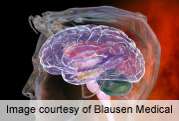Two SNPs predict lithium response in bipolar I disorder

(HealthDay)—For patients with bipolar I disorder, two single nucleotide polymorphisms (SNPs) in glutamate decarboxylase-like protein 1 (GADL1) predict response to lithium, according to a study published online Dec. 25 in the New England Journal of Medicine.
Noting that many patients with bipolar disorders do not respond to lithium therapy, Chien-Hsiun Chen, Ph.D., from the Institute of Biomedical Sciences in Taipei, Taiwan, and colleagues assessed the response to lithium treatment in subgroups from a sample of 1,761 patients of Han Chinese descent with bipolar I disorder. A genome-wide association study was performed on a subgroup of 294 patients with bipolar I disorder who were receiving lithium. The SNPs with the strongest association with response were assessed in a replication sample of 100 patients and then in a follow-up sample of 24 patients. GADL1 was sequenced in 94 patients with a response to lithium and 94 without.
The researchers found that the strongest associations were seen for rs17026688 and rs17026651 in the genome-wide association study and in the replication sample of 100 patients. The sensitivity for predicting a response to lithium was 93 percent for these two SNPs, and they were able to differentiate between patients with a good and poor response in the follow-up cohort.
"Genetic variations in GADL1 are associated with the response to lithium maintenance treatment for bipolar I disorder in patients of Han Chinese descent," the authors write.
More information:
Abstract
Full Text
Copyright © 2013 HealthDay. All rights reserved.















